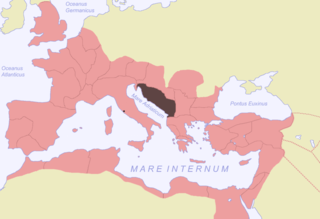Illyrians may refer to:

In classical antiquity, Illyria was a region in the western part of the Balkan Peninsula inhabited by numerous tribes of people collectively known as the Illyrians. Illyrians spoke the Illyrian language, an Indo-European language, which in ancient times perhaps also had speakers in some parts of Southern Italy. The geographical term Illyris was sometimes used to define approximately the area of northern and central Albania down to the Aoös valley, including in most periods much of the lakeland area. In Roman times the terms Illyria / Illyris / Illyricum were extended from the territory that was roughly located in the area of the south-eastern Adriatic coast and its hinterland, to a broader region stretching between the Adriatic Sea and the Danube, and from the upper reaches of the Adriatic down to the Ardiaei. From about mid 1st century BC the term Illyricum was used by the Romans for the province of the Empire that stretched along the eastern Adriatic coast north of the Drin river, south of which the Roman province of Macedonia began.
Illyrian may refer to:
Illyricum may refer to:

The Illyrians were a group of Indo-European speaking peoples, who inhabited the western Balkan Peninsula in ancient times. They constituted one of the three main Paleo-Balkan populations, along with the Thracians and Greeks.
Illyria is a historical region in Southeastern Europe, inhabited in antiquity by the Illyrians.

Illyricum was a Roman province that existed from 27 BC to sometime during the reign of Vespasian. The province comprised Illyria/Dalmatia in the south and Pannonia in the north. Illyria included the area along the east coast of the Adriatic Sea and its inland mountains, eventually being named Dalmatia. Pannonia included the northern plains that now are a part of Serbia, Croatia and Hungary. The area roughly corresponded to the part or all of territories of today's Albania, Kosovo, Montenegro, Serbia, Bosnia and Herzegovina, Croatia, and Slovenia.

Illyrius is the son of Cadmus and Harmonia, who eventually ruled Illyria and became the eponymous ancestor of the Illyrians. Illyrius/Illyriós/Illyri is a name known in different stories found in ancient Greek mythology.
Illyro-Roman is a term used in historiography and anthropological studies for the Romanized Illyrians within the ancient Roman provinces of Illyricum, Moesia, Pannonia and Dardania. The term 'Illyro-Roman' can also be used to describe the Roman settlers who colonized Illyricum.
The Parthini, Partini or Partheni were an Illyrian tribe that lived in the inlands of southern Illyria. They likely were located in the Shkumbin valley controlling the important route between the Adriatic Sea and Macedonia, which corresponded to the Via Egnatia of Roman times. Consequently, their neighbours to the west were the Taulantii and to the east the Dassaretii in the region of Lychnidus.
Mytilos or Mytilus was an Illyrian king who reigned in southern Illyria. He was the successor of Monunius I, and probably his son. Mytilus is mentioned by Pompeius Trogus and Frontinus reporting the events of the military conflict between the Illyrians and the Epirotes under Alexander II, son of Pyrrhus. From around 270 BC Mytilus minted in Dyrrhachion his own bronze coins bearing the king's name and the symbol of the city.
Promona was an ancient city inhabited by the Illyrians. Promona was the location a Roman cohort in the territory of the Delmatae. The location is the modern-day village of Tepljuh, north of Drnis.
Illyricus may refer to:
Epidaurus or Epidauros was an ancient Greek colony founded sometime in the 6th century BC, renamed to Epidaurum during Roman rule in 228 BC, when it was part of the province of Illyricum, later Dalmatia. It is located at the modern-day Cavtat in Croatia, 15 km (9 mi) south of Dubrovnik.
Pelion, also Pellion or Pelium was a fortified settlement of the Dassaretae located on the borderlands between southern Illyria and Macedonia in classical and Roman antiquity. The precise location of Pelion is uncertain and various theories been proposed for the site of the settlement in the Dassaretis region, in Epirus Nova and in Illyricum. It passed different phases of control: the Chaonian tribe of Dexaroi, a coalition of Illyrian tribes, the Macedonian kingdom and finally Rome since at least 198 BCE.
Parthus or Parthos was a settlement of the Illyrian tribe of the Parthini in southern Illyria, modern Albania. Although different sites in central Albania have been proposed, its exact location has not yet been found.
Pleuratus III was a ruler of the Illyrian kingdom under the Labeatan dynasty. He was the son of Scerdilaidas. Pleuratus continued his father's pro-Roman policy even more decidedly, so much that his loyalty to Rome was well known, even to other dynasts. He managed to extend the boundaries of the Illyrian State in the south when he was rewarded land annexed by Philip V of Macedon. He became one of the most prominent Illyrian kings of the time all because of his loyalty to the Romans. Pleuratus was succeeded by his son Gentius, who was the last Illyrian king.

Mazaei or Maezaei were a sub-tribe of the Illyrians, settled in what later became Pannonia. They were autochthonous, and inhabited the interior of today's Bosnia and Herzegovina, mainly in the Sana river basin, the middle course of Vrbas, and around the Vrbanja and Ugar rivers.
Palaeste or Palaiste was a town in the Ceraunian Mountains on the southern Adriatic coast between Illyria and Epirus in classical antiquity. It was located near modern day Palasë in Albania.
Illyrology or Illyrian studies is interdisiplinary academic field which focuses on scientific study of Illyria and Illyrians as a regional and thematic branch of the larger disciplines of ancient history and archaeology. A practitioner of the discipline is called Illyrologist. His duty is to investigate the range of ancient Illyrian history, culture, art, language, heraldry, numizmatic, mythology, economics, ethics, etc. from c. 1000 BC up to the end of Roman rule around the 5th century.